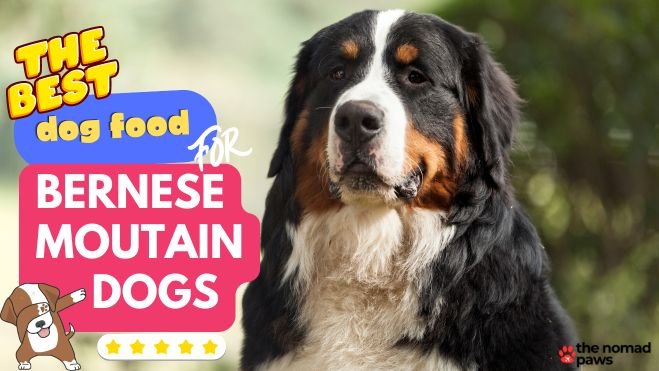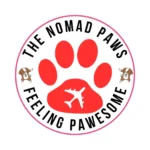Bernese Mountain Dogs require a carefully balanced diet to maintain their impressive stature and luxurious coat while supporting their joint health.
Similar to choosing the best food for Golden Retrievers, selecting the right nutrition for your Berner is crucial.
With so many options on the market, from specially formulated kibble to raw diets, it’s easy to feel overwhelmed. This is especially true when considering breed-specific needs, like finding the best Labrador food or the right Dalmatian puppy food.
Choosing the right food doesn’t have to be an intimidating task. By understanding your Berner’s unique nutritional needs, you’ll be well on your way to ensuring your furry friend thrives.
Let’s explore what makes a diet truly ideal for these beloved Swiss beauties.
Our Methodology
The Nomad Paws team consulted 7 professional canine nutritionists to gather expert opinions on various dog food products.
These specialists helped us evaluate and select the best options specifically tailored for Bernese Mountain Dogs, considering their unique nutritional requirements and health concerns.
High-Quality Protein Sources
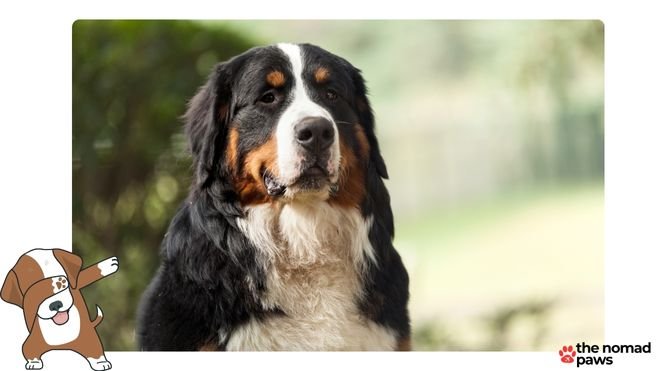
When it comes to feeding your Bernese Mountain Dog, protein is the star of the show.
You’ll want to focus on high-quality sources that provide essential amino acids, healthy fats for energy, and complex carbohydrates to keep your furry friend going strong.
It’s also essential to take into account their specific nutritional requirements, as large breeds like Bernese Mountain Dogs benefit from a diet that supports healthy bone growth and joint health, similar to what is recommended for Great Danes.
Don’t forget about those vital antioxidants either – they’re key for boosting your pup’s immune system and overall health.
Vet’s Tip: When selecting a protein-rich diet for your Bernese Mountain Dog, aim for foods with at least 25-30% protein content.
High-quality, easily digestible protein sources like chicken, turkey, or fish can help maintain muscle mass and support overall health.
Brands like Orijen and Wellness Core offer formulations with over 38% protein, perfect for supporting your Berner’s muscular needs.
A balanced diet with various protein sources guarantees your furry friend gets all the amino acids they need for immune function and tissue repair.
Consider freeze-dried raw options, which retain up to 95% of their nutrient value, providing an excellent amino acid profile for your Bernese Mountain Dog’s ideal health.
Healthy Fats for Energy
Now that we’ve covered essential amino acids, let’s explore the world of healthy fats and high-quality protein sources for your Bernese Mountain Dog.
These gentle giants need a diet rich in both to thrive. Healthy fats, especially omega-3 fatty acids found in fish oil, are essential for your furry friend’s energy and joint health.
They help reduce inflammation, which is super important for these big pups. Additionally, a proper balance of proteins, fats, and carbohydrates is critical for overall health and energy levels.
Vet’s Tip: Consider adding a high-quality fish oil supplement to your Bernese Mountain Dog’s diet to boost their omega-3 fatty acid intake.
My recommended choice fot Bernese Mountain Dogs is the Fish Oil Omega3 by PawfectChew. These healthy treats are packed with is packed with valuable Omega 3 6 9 fatty acid (with EPA and DHA), vitamins and minerals.
Complex Carbs for Energy
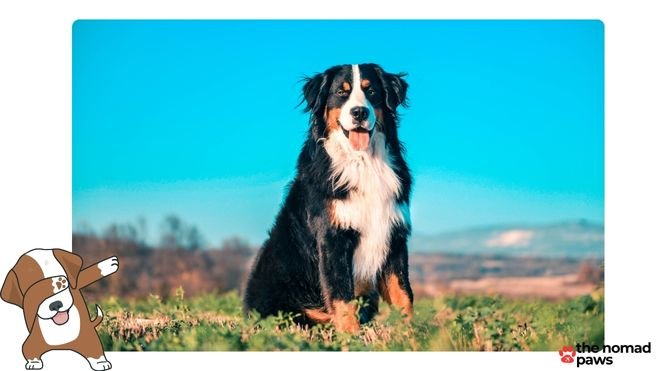
Complex carbs and high-quality proteins are the dynamic duo your Bernese Mountain Dog needs for long-lasting energy.
Foods rich in complex carbohydrates, like sweet potatoes and brown rice, provide sustained energy without causing blood sugar spikes. This is vital for your big buddy’s active lifestyle.
A balanced diet with 26-32% protein and plenty of complex carbs will keep your furry friend energized for daily activities and exercise.
Vet’s Tip: When selecting food for your Bernese Mountain Dog, opt for formulas specifically designed for large breeds.
These contain the right balance of nutrients to support their unique nutritional needs and help prevent common health issues associated with large dog breeds.
Best Dog Food for Bernese Mountain Dogs: Our Picks
Selecting the ideal nutrition for your Bernese Mountain Dog is crucial for their health and longevity.
These gentle giants require a diet rich in high-quality proteins, balanced fats, and joint-supporting nutrients.
Large breed formulas are particularly beneficial, as they cater to the unique needs of these majestic dogs.
In this part of our guide, we’ll explore top dog food options that meet the nutritional requirements of Bernese Mountain Dogs, ranging from premium choices to more budget-friendly alternatives.
Each selection has been carefully evaluated to ensure it supports your furry friend’s growth, maintains their coat, and promotes overall well-being.
Royal Canin for Large Breeds
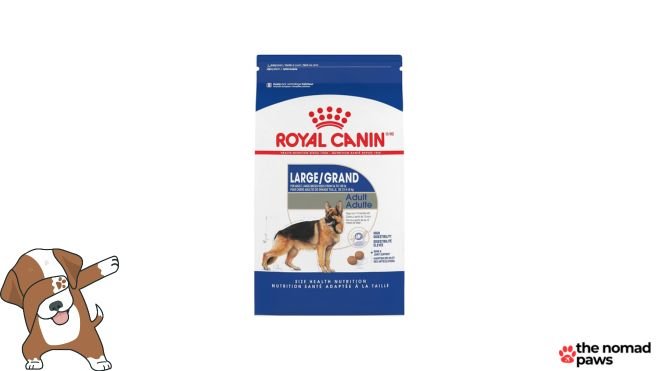
Specifically formulated for large dog breeds like Bernese Mountain Dogs, this kibble addresses their unique needs.
Its large, custom-shaped pieces encourage slower eating, while glucosamine and chondroitin support joint health. The balanced protein and fat content helps maintain muscle mass without excess weight gain.
Purina Pro Plan Large Breed Adult
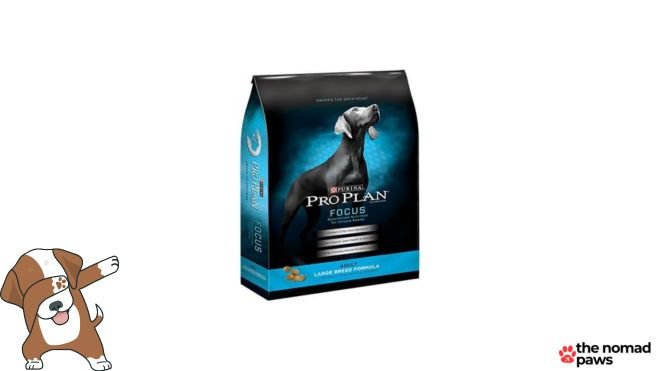
A favorite among breeders, this formula boasts real chicken as the first ingredient. It’s enriched with EPA and glucosamine for joint health, crucial for large breeds like Bernese Mountain Dogs. The added probiotics support digestive health, making it an excellent all-around choice.
Orijen Original Grain-Free Dry Dog Food
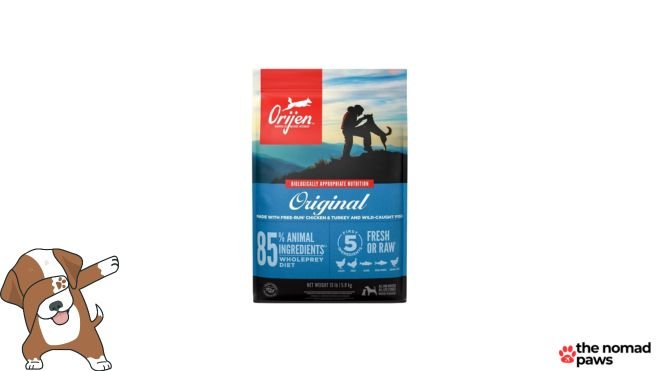
For those preferring a grain-free option, Orijen delivers with its high protein content from fresh and raw animal ingredients. This nutrient-dense food mirrors the diet dogs would eat in the wild, supporting muscle development and energy levels in active Bernese Mountain Dogs.
Hill’s Science Diet Large Breed Adult
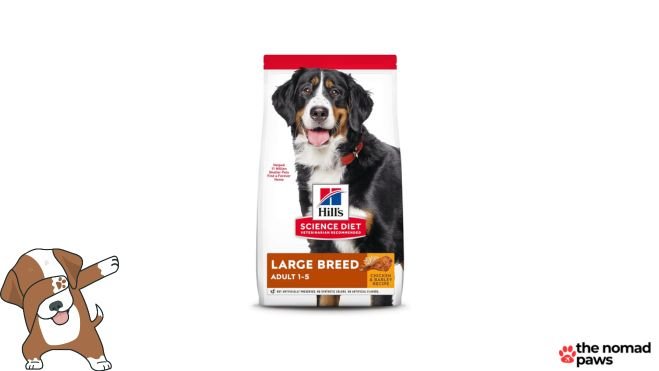
Trusted by veterinarians, this formula provides balanced nutrition with controlled levels of calcium for optimal bone health. It includes natural sources of glucosamine and chondroitin, supporting the joints of these large, heavy-boned dogs.
Wellness CORE Large Breed
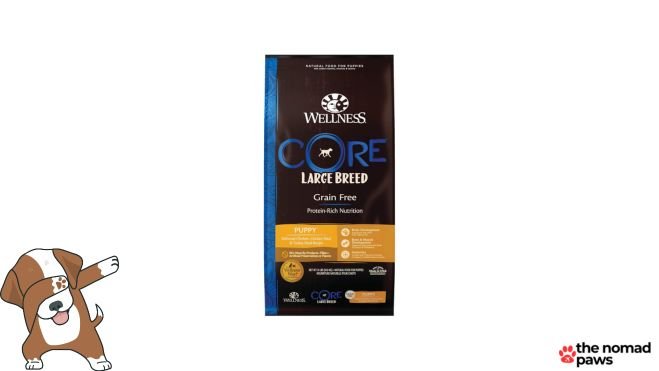
This grain-free recipe is packed with premium proteins and fortified with taurine for heart health. The inclusion of probiotics and omega fatty acids promotes digestive health and maintains the Bernese Mountain Dog’s luxurious coat.
Blue Buffalo Life Protection Formula Large Breed Adult
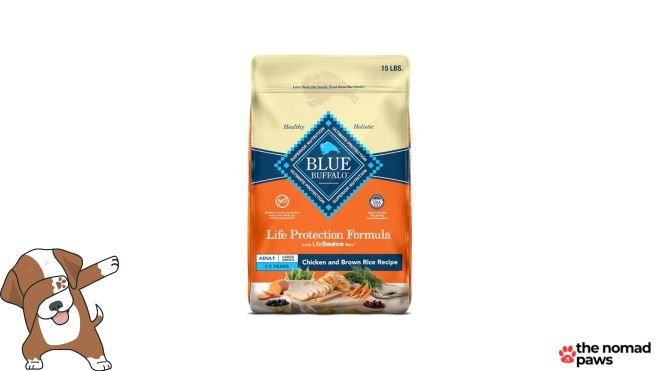
Featuring deboned chicken and brown rice, this formula offers a good balance of proteins and complex carbohydrates. The LifeSource Bits provide a blend of antioxidants, vitamins, and minerals tailored for large breed health.
Nutro Natural Choice Large Breed Adult
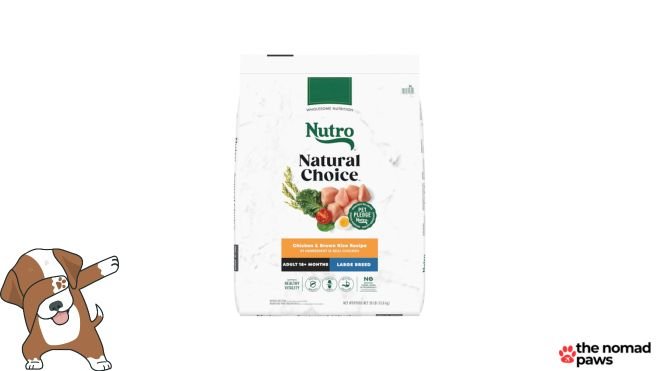
Made with non-GMO ingredients, this chicken and brown rice recipe is easy on the stomach while providing essential nutrients. The balanced fiber content and natural ingredients make it a great choice for Bernese Mountain Dogs with sensitive digestion.
Diamond Naturals Large Breed Adult
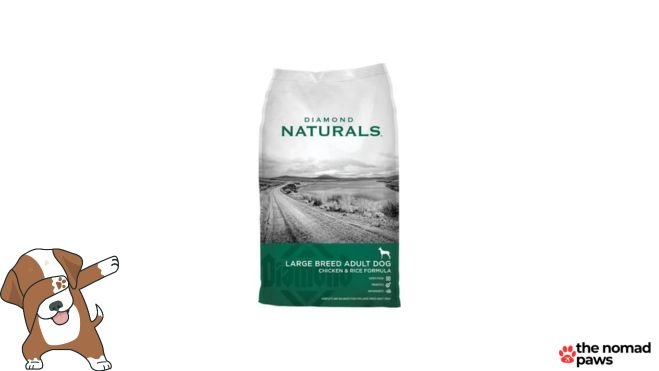
A more budget-friendly option that doesn’t compromise on quality, this formula includes superfoods and probiotics. The balanced omega fatty acids help maintain the Bernese Mountain Dog’s thick, beautiful coat.
Taste of the Wild Pacific Stream
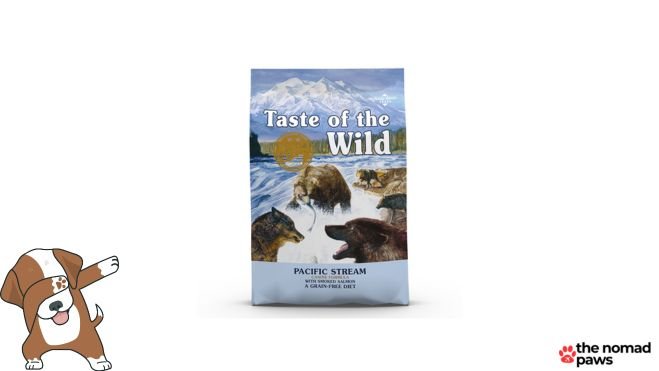
For Bernese Mountain Dogs with food sensitivities, this fish-based formula offers novel protein sources. Rich in omega-3 fatty acids, it supports skin health and coat shine while providing grain-free nutrition.
Eukanuba Large Breed Adult
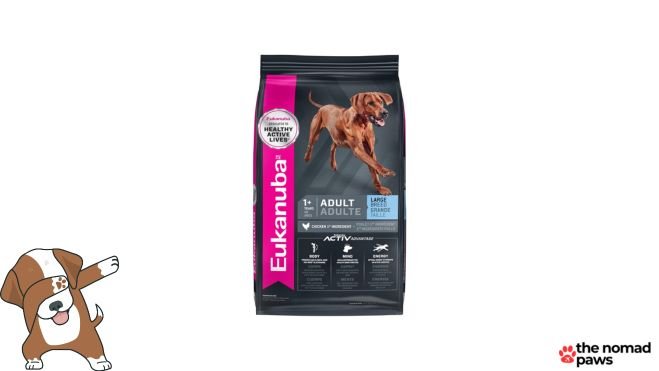
Rounding out our list, this chicken-based formula includes 3D DentaDefense, which helps reduce tartar build-up. Its optimal protein levels and L-carnitine content support lean muscle mass, important for the Bernese Mountain Dog’s large frame.
Allergies and Sensitivities Considerations
Your Bernese Mountain Dog might be dealing with food allergies and sensitivities. These can show up as itchy skin, tummy troubles, or weight changes.
Don’t worry, though – there are ways to help your furry friend feel better. A hypoallergenic diet could be the answer. Look for foods with limited ingredients or novel protein sources like lamb or duck. These can be easier on your dog’s system.
Vet’s Tip: When switching to a hypoallergenic diet, transition gradually over 7-10 days to avoid digestive upset. Mix increasing amounts of the new food with decreasing amounts of the old food.
Royal Canin Hydrolyzed Protein Formula is a top pick for Berners with allergies. It uses special soy proteins that are less likely to cause reactions.
Also, keep an eye out for foods rich in Omega-3 fatty acids. They’re great for skin and coat health, which can help with allergy symptoms.
Weight Management Formulations
Let’s shift gears and talk about keeping your Bernese Mountain Dog at a healthy weight.
These lovable giants can pack on pounds quickly, so it’s essential to choose the right food. Look for weight management formulations that offer lower calories and higher fiber content.
For example, Blue Buffalo Life Protection Large Breed Healthy Weight Formula includes L-Carnitine for lean muscle and 11% fiber to keep your pup feeling full.
Vet’s Tip: Be mindful of treats and table scraps. Limit these extras to no more than 10% of your Bernese Mountain Dog’s daily caloric intake to maintain a healthy weight.
Watch your dog’s caloric intake carefully, adjusting based on age and activity level. Divide meals into two portions daily for better weight control.
Don’t forget that exercise plays a big role, too! A daily walk or play session can work wonders. If you’re unsure about the best food choice, chat with your vet.
They can provide personalized advice to keep your Bernese Mountain Dog in tip-top shape.
Our Nutritionists Say: Top picks for Bernese Mountain Dogs include weight management formulas like Hill’s Science Diet Perfect Weight Large Breed Adult and Royal Canin Large Weight Care. These foods provide balanced nutrition while helping to maintain a healthy weight.
Choosing the Right Food Type for Bernese Mountain Dogs
When it comes to feeding your Bernese Mountain Dog, you’ve got options.
You’ll want to contemplate dry kibble, wet food, raw diets, and freeze-dried options, each with their own benefits.
Let’s explore these choices to help you find the best fit for your furry friend’s needs and your lifestyle.
Dry Kibble
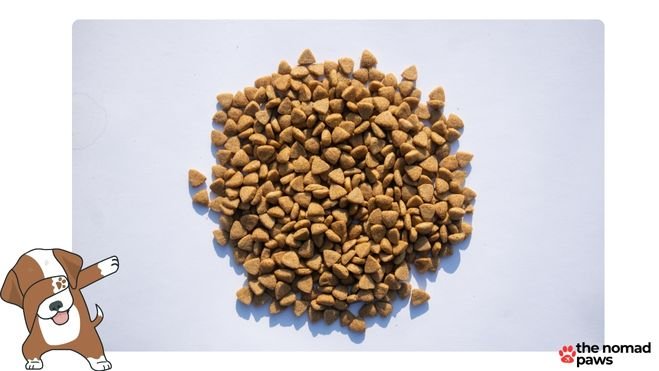
Choosing the right dry kibble for your Bernese Mountain Dog can feel like a challenging task, but it’s essential for their health and well-being.
Look for formulas designed specifically for large breeds, which support muscle development and joint health.
You’ll want to find dry dog food with high-quality protein as the first ingredient, aiming for protein levels between 26-32%. This helps maintain your furry friend’s muscle mass and overall health.
Vet’s Tip: For Bernese Mountain Dogs, choose kibble with added glucosamine and chondroitin to support joint health, as this breed is prone to hip and elbow dysplasia.
Don’t forget to check for added glucosamine and chondroitin, which are vital for joint health in this breed prone to hip and elbow dysplasia.
Omega fatty acids are also important for keeping their skin and coat healthy. To address their sensitive tummies, opt for kibble with probiotics.
Wet Food

Bernese Mountain Dog owners often wonder if wet food is a good option for their gentle giants. Well, you’ll be happy to know that wet dog food can be an excellent choice for your furry friend.
It’s packed with moisture, which helps keep your Berner hydrated and can be easier on sensitive tummies.
Plus, many wet food options boast higher protein levels than dry kibble, supporting your big buddy’s muscle maintenance needs.
Look for options rich in omega fatty acids for a healthier coat. Remember to shift slowly to avoid upset stomachs, and always consult your vet for personalized feeding advice based on your Bernese Mountain Dog’s unique needs.
Raw Diet
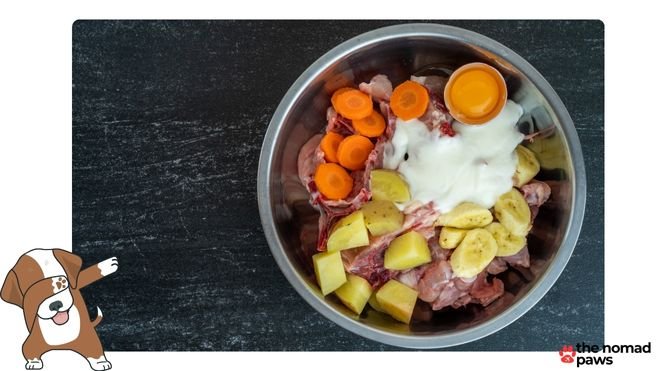
A raw diet typically consists of uncooked meat, organs, and bones, providing high protein content essential for your Berner’s muscle development and overall health.
This feeding approach can benefit your dog’s dental health, as chewing raw bones helps reduce plaque buildup. When considering a raw diet, it’s vital to balance the meals with appropriate amounts of organ meats and vegetables to guarantee a well-rounded nutritional intake.
If your Bernese has food sensitivities, a raw diet can be tailored to accommodate their specific needs.
Remember, shifting to a raw diet should be done gradually to avoid digestive issues. Start with small amounts and increase over time. Always consult your veterinarian before making significant changes to your dog’s diet.
Vet’s Tip: When transitioning to a raw diet, ensure proper food handling and storage to prevent bacterial contamination.
Thoroughly clean all surfaces and utensils used in meal preparation, and always wash your hands before and after handling raw ingredients.
Freeze-Dried Options
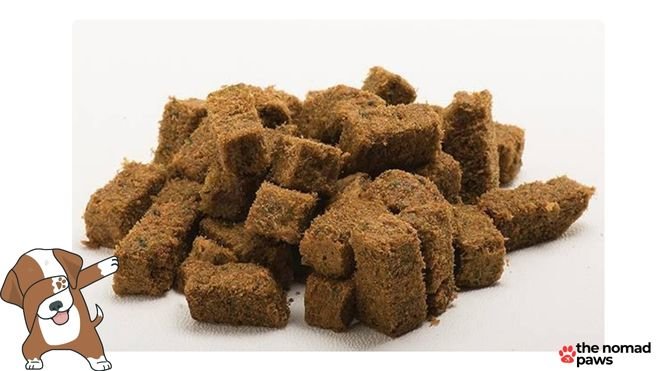
If you’re looking for a convenient alternative to raw feeding, freeze-dried options might be right up your alley.
These foods retain up to 95% of their nutrient value, providing your Bernese Mountain Dog with high-quality protein for muscle maintenance. Plus, they’re lightweight and easy to store, perfect for busy dog parents like you.
Freeze-dried foods often contain a variety of meats, reducing the risk of food allergies.
They also include whole food ingredients like fruits and vegetables, supporting your pup’s digestive health and providing essential antioxidants.
With their nutritional benefits and convenience, freeze-dried foods could be an excellent choice for your Bernese Mountain Dog’s diet, giving them the nutrients they need to thrive.
Vet’s Tip: When choosing freeze-dried food for your Bernese Mountain Dog, look for options that meet AAFCO standards for complete and balanced nutrition.
Grain-Free: Boon or Bane?

You might’ve heard about grain-free diets for dogs, and they’re a hot topic for Bernese Mountain Dog owners.
While grain-free foods can help some dogs with sensitive tummies or allergies, they’ve also been linked to heart problems in certain cases.
Improved Digestion for Sensitive Dogs
If your furry friend has a sensitive stomach, you might be considering this option.
Grain-free diets can help reduce potential allergens and improve digestion for some pups.
However, it’s essential to choose high-quality protein sources and digestible carbohydrates to support your dog’s health and energy levels.
Vet’s Tip: Always consult with your veterinarian before switching to a grain-free diet. They can help you determine if it’s the right choice for your Bernese Mountain Dog and recommend appropriate alternatives if needed.
When switching to grain-free, keep a close eye on your Bernese. Some studies suggest a possible link between these diets and heart issues in certain breeds.
That’s why it’s super important to chat with your vet before making any big changes. They can help you find the right balance of nutrients for your gentle giant.
Potential Nutrient Imbalances
Grain-free diets for Bernese Mountain Dogs aren’t all sunshine and rainbows. While they can help some pups with sensitive tummies, these diets might lead to nutrient imbalances if they’re not carefully formulated.
Your big, fluffy friend has specific dietary needs, and grain-free options often swap out grains for ingredients like peas and lentils.
This switch can mess with the delicate balance of nutrients your Bernese Mountain Dog requires, especially when it comes to calcium and phosphorus ratios.
Dcm-Heart Disease Risk
Three little words have been causing quite a stir in the dog food world lately: dilated cardiomyopathy, or DCM for short.
If you’re a Bernese Mountain Dog owner, you might’ve heard whispers about grain-free diets and heart problems.
Recent studies have shown a possible link between grain-free dog foods and DCM cases in certain breeds, including our beloved Berners.
The FDA’s been investigating dog foods formulated with peas, lentils, and potatoes, which are common in grain-free diets.
These ingredients might not provide all the nutrients your furry friend needs for a healthy heart.
Don’t panic, though! You can help protect your pup by choosing high-quality dog food that meets AAFCO standards and includes whole grains.
Regular vet check-ups are essential, too. Keep an eye out for signs like tiredness or coughing, and always consult your vet about the best diet for your Berner.
Age-Based Dietary Requirements forBernese Mountain Dogs
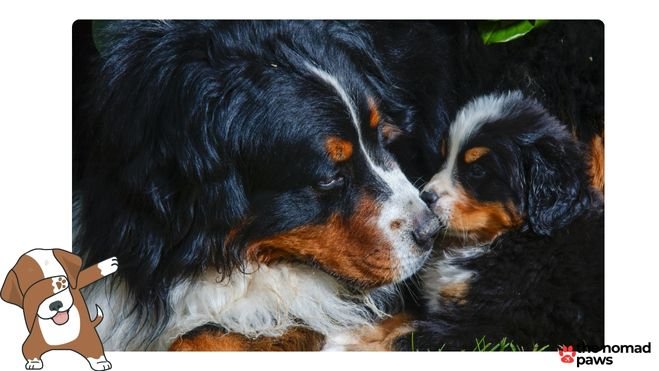
Your Bernese Mountain Dog’s nutritional needs change as they grow from a bouncy puppy to a dignified senior.
You’ll need to adjust their diet at each life stage to keep them healthy and happy.
Let’s look at what your Berner needs from puppyhood through their golden years.
Bernese Mountain Dogs Puppy Nutrition
Your growing furball needs a high-quality, puppy-specific formula to support their rapid development.
Look for food with at least 29% protein to build those strong muscles they’ll need for all their future adventures.
Don’t forget about essential fatty acids like Omega-3 and Omega-6 – they’re vital for your pup’s brain and eye development. You’ll want to aim for about 407 calories per cup to keep your Bernese at a healthy weight.
Adult Bernese Mountain Dogs Nutrition
Once your Bernese Mountain Dog reaches adulthood, their nutritional needs shift gears.
Adult Bernese Mountain Dogs require a protein-rich diet to maintain their muscular build and overall health. Look for foods with at least 26% protein, featuring real meat as the first ingredient.
Don’t forget about those essential omega-3 fatty acids, which keep your Berner’s coat shiny and skin healthy. You’ll also want to guarantee a balanced ratio of calcium and phosphorus for strong bones, especially as your furry friend ages.
Senior Bernese Mountain Dogs Nutrition
As your Bernese Mountain Dog enters their golden years, typically around age 6, their nutritional needs undergo another significant shift.
Senior Bernese Mountain Dogs require a diet with lower caloric content to prevent weight gain, which can strain their joints.
Look for foods that support joint health with ingredients like glucosamine and chondroitin. These gentle giants also benefit from increased fiber for better digestive health.
When choosing food for your senior Bernese, prioritize high-quality protein sources to maintain muscle mass. Aim for a protein content of 20-25% to keep your furry friend strong and healthy.
Our Nutritionists Say: Consider incorporating wet food into your senior Bernese Mountain Dog’s diet. Wet food can be easier to chew and digest, and it provides additional hydration, which is particularly beneficial for older dogs.
How Much Should a Bernese Mountain Dog Eat?
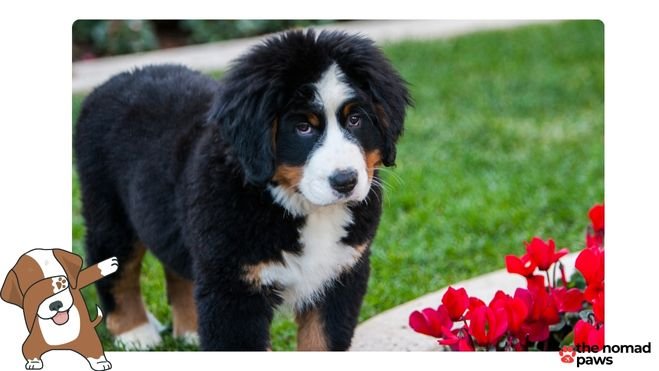
You’ll need to adjust your Bernese Mountain Dog’s feeding schedule and portion sizes as they grow from puppyhood to adulthood and into their senior years.
Puppies require more frequent meals and higher calorie intake, while adult Berners need a consistent routine to maintain their health.
As your furry friend enters their golden years, you’ll want to modify their diet to account for reduced activity levels and changing nutritional needs.
Bernese Mountain Dogs Puppy Feeding Guidelines
Your puppy’s feeding guidelines should include 3-4 meals daily until they’re about six months old. After that, shift to 2-3 meals a day.
When introducing new foods, do it gradually over a week to avoid tummy troubles.
Vet’s Tip: Keep an eye on portion sizes, adjusting them based on your pup’s weight, activity, and growth rate. This helps prevent obesity while supporting proper development.
Adult Bernese Mountain Dogs Feeding Guidelines
Adult Bernies should eat 2-3 meals a day, with a total calorie content of 1,700 to 2,500 calories, depending on their activity level and weight.
Active dogs may need more food, while less active ones might require smaller portions. Keep an eye on your Bernie’s weight, as they’re prone to obesity.
When changing their food, do it gradually over 7-10 days to avoid tummy troubles. This slow shift guarantees your furry friend’s digestive system adapts smoothly to the new diet.
Senior Bernese Mountain Dogs Feeding Guidelines
Senior Bernese Mountain Dogs require about 20% fewer calories than their younger counterparts to maintain a healthy weight.
You’ll want to switch to a diet that’s lower in calories but higher in fiber, aiming for 4-6% fiber content in dry food. This helps support their digestive health as they age.
It’s best to feed your older dog 2-3 smaller meals throughout the day, which can aid digestion and reduce the risk of bloat.
Artificial Preservatives and Fillers
You might be surprised to learn that many lower-quality kibbles contain these potentially harmful ingredients.
Artificial preservatives like BHA, BHT, and ethoxyquin can pose serious health risks for your Bernese Mountain Dog, including cancer and liver damage.
Fillers such as corn, wheat, and soy are often used to bulk up food cheaply, but they offer little nutritional value and may cause digestive issues or allergies.
Vet’s Tip: Always check the ingredient list on your dog’s food. Avoid products containing artificial preservatives like BHA, BHT, and ethoxyquin, as well as fillers like corn, wheat, and soy.
To meet your Berner’s specific health needs, opt for high-quality ingredients and natural preservatives like vitamin E.
Premium dog foods that avoid artificial additives and fillers can improve your pup’s digestion, skin health, and coat shine.
Hip Dysplasia Risk
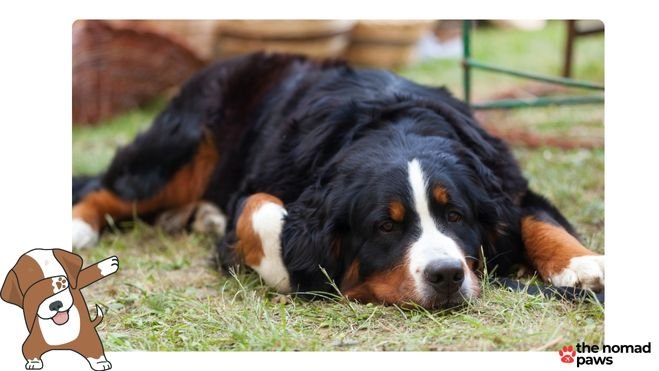
Now, let’s tackle a big concern for Bernese Mountain Dog owners: hip dysplasia.
This genetic condition affects about 25% of these gentle giants, but don’t worry – you can take steps to help your furry friend.
Proper nutrition plays a vital role in managing hip dysplasia risk. When your Berner’s a pup, focus on a diet with balanced calcium levels to support healthy bone development.
As they grow, look for foods rich in joint-supporting nutrients like glucosamine and chondroitin. These can help maintain joint health and ease the impact of hip dysplasia.
Vet’s Tip: Regular vet check-ups are crucial for early detection and management of hip dysplasia in Bernese Mountain Dogs. Don’t skip those appointments!
Gradual Food Swap Process
When swapping your Bernese Mountain Dog’s food, keep a close eye on their tummy. You’ll want to watch for any signs of digestive upset, like vomiting or diarrhea.
If you notice these symptoms, it’s best to slow down the changeover process or consult your vet for advice.
Our Nutritionists Say: When transitioning your Bernese Mountain Dog to a new food, mix the old and new foods gradually over 7-10 days.
Start with 25% new food and 75% old food, slowly increasing the new food proportion every few days
Watch out for signs of tummy troubles, like vomiting, diarrhea, or excessive gas.
If you notice any of these, it might be time to slow down the shift or reconsider your food choice.
Don’t hesitate to reach out to your vet if problems persist – they’re the experts who can offer tailored advice for your Bernese’s specific needs.
Throughout the process, keep an eye on your dog’s stool quality. It’s a great indicator of how well they’re adjusting to the new food and can help you make sure they’re digesting it properly.


